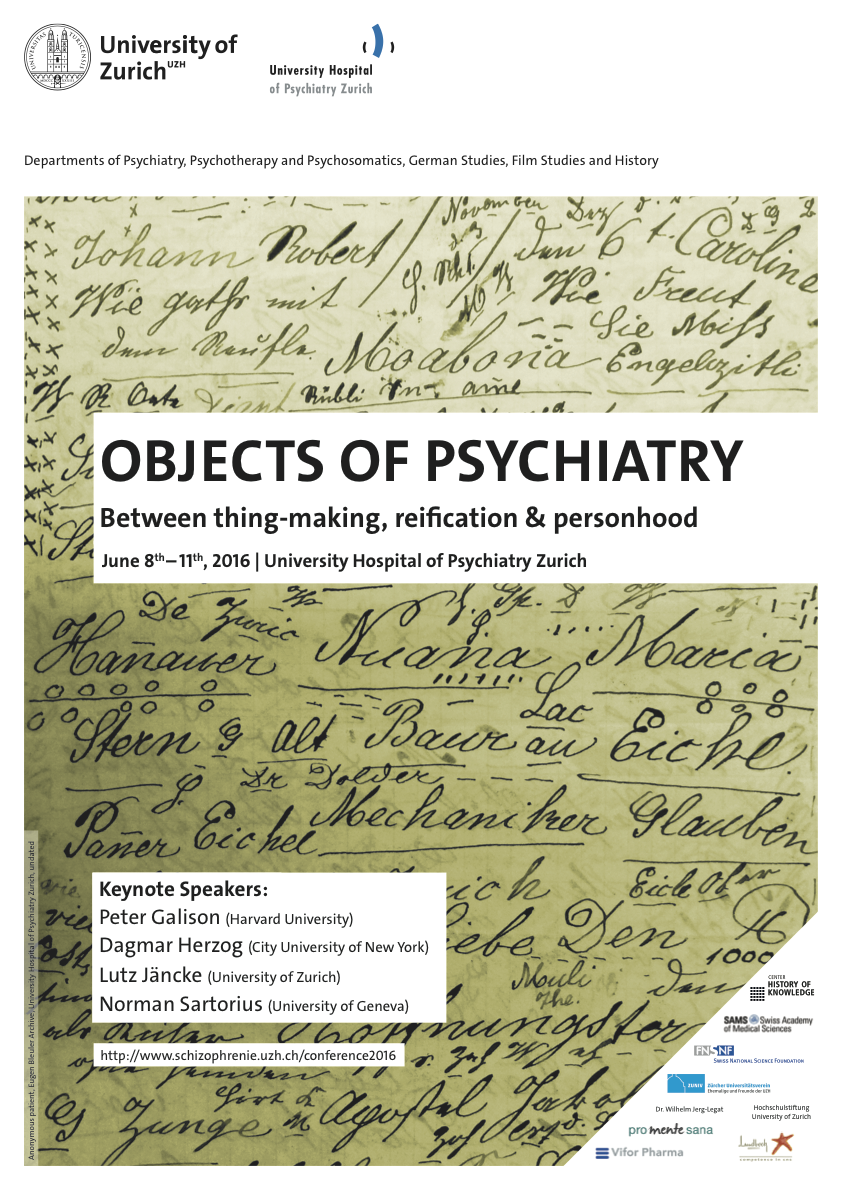"Schizophrenia": Reception, semantic shift, and criticism of a concept in the 20th century
Introduced into academic discourse by Zurich psychiatrist Eugen Bleuler in 1908, the term "schizophrenia" quickly led to the abandonment of previous and alternative terms like for instance Emil Kraepelin’s "dementia praecox". Questioning the biological, biographical and social aetiologies of mental illness, the term not only became central to psychiatry but also gained influence in various societal contexts.
Working from the perspectives of psychiatry, philosophy, linguistics, history, and film studies we aim to provide an analysis of the reception, semantic shift and criticism of the term as well as the metaphor "schizophrenia". Exploring the constant re-negotiation of the concept between clinical psychiatry and society, we hope to contribute to a deeper understanding of the historical and cultural role of mental illness. We seek exchance with people affected by mental illness and will share results with them as well as with the wider public.
The Psychiatric Project
The psychiatric project analyses the history of the reception of "schizophrenia" as well as its effects on psychiatric and psychopathological discourse and practice. Nosological, aetiological and therapeutic aspects will be considered alongside questions regarding theoretical presuppositions implied in this central psychiatric term and psychiatry’s self-understanding expressed through it. The close reading of psychiatric publications from Bleuler till today, academic and textbook, will be linked with the analysis of current debates regarding the relationship of neurobiology and meaningful experience, the reification of psychiatric diagnoses, and the general criticisms of the term "schizophrenia" brought forward in recent years.
Besides the detailed conceptual analysis of publications in academic psychiatry, the research process will crucially involve those who are personally or professionally affected by mental illness today, and results will be shared with them. In accordance with the interdisciplinary conception of the project, the constant re-negotiation of psychiatric terms between clinical psychiatry and society will be a special focus of the research.
Prof Paul Hoff, MD PhD (project director) and Anke Maatz, MA MD (postdoctoral researcher)
The Linguistic Project
The linguistic project aims to trace the career of the term "schizophrenia" within everyday language. Central to this analysis are questions regarding the surprisingly quick adoption of the term into non-psychiatric discourses, the different patterns of use as well as its re-semantisation over the course of the 20th century. What socio-cultural interpretations can be inferred from this process? Methodologically, the research will draw on systematic corpus-linguistic analysis and investigate the relationship between linguistic patterns of expression, semantic potential and connotations around the lexical field "schizo-" from its introduction by Bleuler until today.
Prof. Dr. phil. Angelika Linke (co-director) and lic. phil. Yvonne Ilg (PhD student)
The Historic Project
The historic project explores "schizophrenia" as an object of psychiatric research. Examining investigative studies of families of schizophrenics and their impact on the disorder between the 1940s and the early 1980s, it seeks to investigate the processes by which knowledge of schizophrenia was produced and disseminated. Moreover, the project aims to identify the very nature of such knowledge, and how "schizophrenia" was subsequently conceptually transformed.
Prof. em. Dr. phil. Jakob Tanner (co-director) and MA Marina Lienhard(PhD student)
The Film Studies Project
The project based in film studies investigates the change of the term "schizophrenia" between clinic and criticism within the discourse established by visual / aesthetic models. It assumes that the "schizophrenic" experience draws from pictorial-perceptional elements, is accordingly influenced by the visual media, and vice versa reflects itself in the latter. As an innovative, transdisciplinary project based in film- and visual studies, this research aims to contribute to a history and geography of the concept of schizophrenia as well as to an expansion of film studies’ paradigms.
Prof. Dr. phil. Margrit Tröhler (co-director) and Dr. phil. Veronika Rall (postdoctoral researcher)

